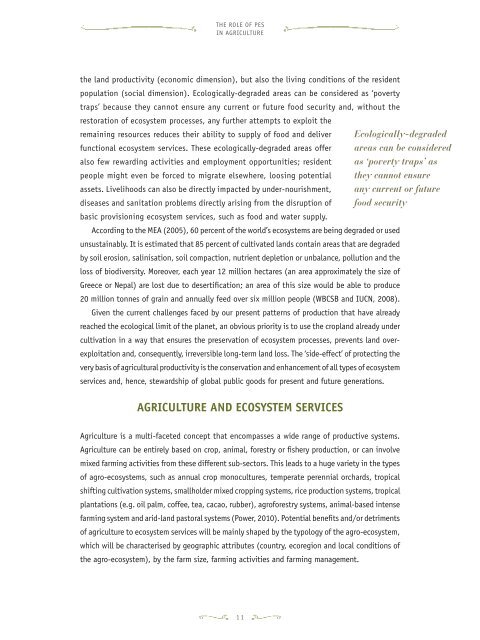agriculture and ecosystem services - Serena
agriculture and ecosystem services - Serena
agriculture and ecosystem services - Serena
You also want an ePaper? Increase the reach of your titles
YUMPU automatically turns print PDFs into web optimized ePapers that Google loves.
The role of PESin <strong>agriculture</strong>the l<strong>and</strong> productivity (economic dimension), but also the living conditions of the residentpopulation (social dimension). Ecologically-degraded areas can be considered as ‘povertytraps’ because they cannot ensure any current or future food security <strong>and</strong>, without therestoration of <strong>ecosystem</strong> processes, any further attempts to exploit theremaining resources reduces their ability to supply of food <strong>and</strong> deliver Ecologically‐degradedfunctional <strong>ecosystem</strong> <strong>services</strong>. These ecologically-degraded areas offer areas can be consideredalso few rewarding activities <strong>and</strong> employment opportunities; resident as ‘poverty traps’ aspeople might even be forced to migrate elsewhere, loosing potential they cannot ensureassets. Livelihoods can also be directly impacted by under-nourishment, any current or futurediseases <strong>and</strong> sanitation problems directly arising from the disruption of food securitybasic provisioning <strong>ecosystem</strong> <strong>services</strong>, such as food <strong>and</strong> water supply.According to the MEA (2005), 60 percent of the world’s <strong>ecosystem</strong>s are being degraded or usedunsustainably. It is estimated that 85 percent of cultivated l<strong>and</strong>s contain areas that are degradedby soil erosion, salinisation, soil compaction, nutrient depletion or unbalance, pollution <strong>and</strong> theloss of biodiversity. Moreover, each year 12 million hectares (an area approximately the size ofGreece or Nepal) are lost due to desertification; an area of this size would be able to produce20 million tonnes of grain <strong>and</strong> annually feed over six million people (WBCSB <strong>and</strong> IUCN, 2008).Given the current challenges faced by our present patterns of production that have alreadyreached the ecological limit of the planet, an obvious priority is to use the cropl<strong>and</strong> already undercultivation in a way that ensures the preservation of <strong>ecosystem</strong> processes, prevents l<strong>and</strong> overexploitation<strong>and</strong>, consequently, irreversible long-term l<strong>and</strong> loss. The ‘side‐effect’ of protecting thevery basis of agricultural productivity is the conservation <strong>and</strong> enhancement of all types of <strong>ecosystem</strong><strong>services</strong> <strong>and</strong>, hence, stewardship of global public goods for present <strong>and</strong> future generations.Agriculture <strong>and</strong> <strong>ecosystem</strong> <strong>services</strong>Agriculture is a multi-faceted concept that encompasses a wide range of productive systems.Agriculture can be entirely based on crop, animal, forestry or fishery production, or can involvemixed farming activities from these different sub-sectors. This leads to a huge variety in the typesof agro-<strong>ecosystem</strong>s, such as annual crop monocultures, temperate perennial orchards, tropicalshifting cultivation systems, smallholder mixed cropping systems, rice production systems, tropicalplantations (e.g. oil palm, coffee, tea, cacao, rubber), agroforestry systems, animal-based intensefarming system <strong>and</strong> arid-l<strong>and</strong> pastoral systems (Power, 2010). Potential benefits <strong>and</strong>/or detrimentsof <strong>agriculture</strong> to <strong>ecosystem</strong> <strong>services</strong> will be mainly shaped by the typology of the agro-<strong>ecosystem</strong>,which will be characterised by geographic attributes (country, ecoregion <strong>and</strong> local conditions ofthe agro-<strong>ecosystem</strong>), by the farm size, farming activities <strong>and</strong> farming management.11


